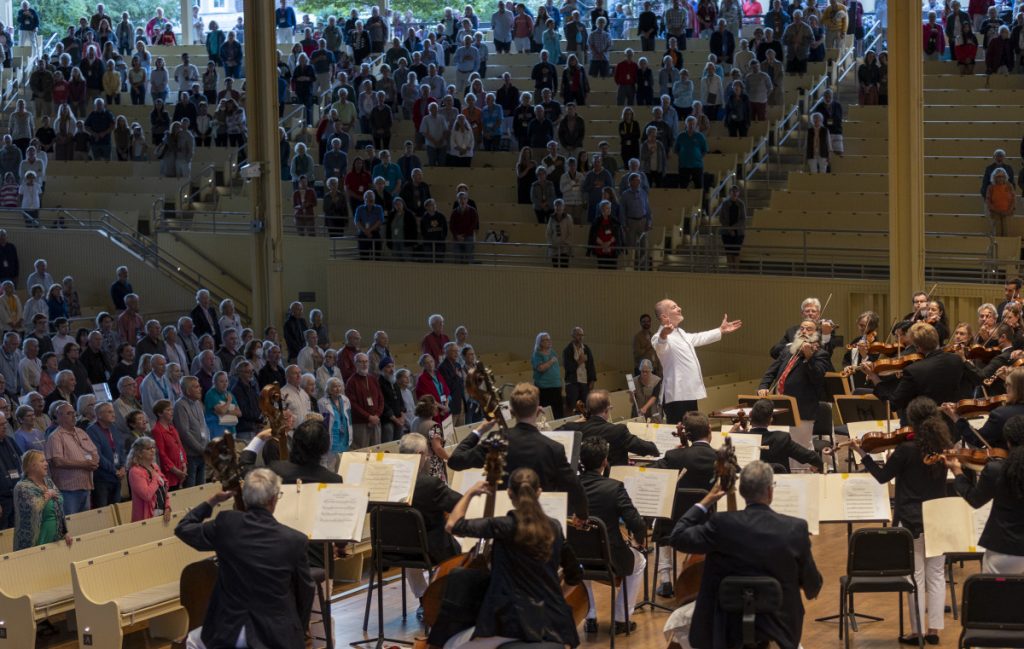NICHOLE JIANG – STAFF WRITER

Following a concert that spotlighted the winds of the Chautauqua Symphony Orchestra, it’s now the strings’ time to shine at 8:15 p.m. Thursday, July 22 in the Amphitheater. The CSO has never done separate concerts for the string and wind sections before, but from COVID-19 regulations came an opportunity to showcase individual sections. And tonight, the CSO string section will be led by music director and conductor of the Music School Festival Orchestra, Timothy Muffitt.
“It’s kind of exciting because the sound of just strings is unique,” said Erica Robinson, CSO violinist. “I think COVID-19 has brought up the opportunity to look at different ways to present the orchestra.”
Tonight’s performance is an opportunity for the audience to experience everything the string section has to offer in a different way.
“I think it’s a different sound experience — just hearing the strings and our sound will fill up the Amphitheater. It’ll just be really beautiful with the lush sound of the strings,” said Barbara Berg, CSO violinist. “It’s a different experience than the winds, who are all expert artists and musicians, but it’s a different sound experience.”
Tonight’s program includes pieces that will allow the musicians of the string section to demonstrate their talents in a more intimate setting. The program will begin with George Walker’s “Lyric for Strings,” and will be followed by Benjamin Britten’s Simple Symphony, Op. 4. The performance will close out with one of the masterpieces of the classical music world: Antonin Dvořák’s Serenade for Strings, B. 52, Op. 22.
“There is some wonderful repertoire for string orchestra that actually seldom finds its way onto concerts for one reason or another,” Muffitt said. “It presents a great chance for our audience to hear these works live, and I know the players embrace the opportunity to play this music as well. These works represent a nice balance of style, character and content that complement each other.”
Composer Walker accomplished many firsts in his lifetime, some of which included being the first Black graduate from the Curtis Institute of Music in 1945, and the first Black musician to perform with the Philadelphia Orchestra.
Walker composed over 90 pieces, but “Lyric for Strings” is one of his best-known works. Walker composed this piece when he was just 24 years old, having never played a string instrument in his life. However, the music is able to capture everything a string instrument can accomplish.
“The ‘Lyric for Strings’ has been one of the greatest hits of 2020 and the pandemic. I have seen it on countless digital programs nationwide in the last year and half,” Muffitt said. “It’s wonderful to see its popularity. … It’s a beautiful and deeply touching work.”
The Simple Symphony, Op. 4 is just as the name states. It’s a simple and playful piece that allows the strings to have some fun on stage.
“The Britten is fun. He aptly named it, calling it the Simple Symphony. There’s something very simple about it so it’s really fun to play,” Robinson said.
Britten began composing music when he was a child. The Simple Symphony actually pulls parts from melodies he wrote when he was just 9 years old.
“I’ve always had a soft spot for the Britten Simple Symphony,” said Olga Kaler, first violinist. “It’s such a lovely piece.”
Each movement of the Simple Symphony has a fun name to it: Boisterous Bourrée, Playful Pizzicato, Sentimental Sarabande and Frolicsome Finale. This piece, though childlike in many ways, simultaneously shows Britten’s mastery.
The closing number of this piece is loved and respected by both musicians and non-musicians alike, and the string section performing Serenade For Strings is excited to be playing this masterpiece on the Amp stage.
“I’m really excited to play the Dvořák — it’s a really beautifully written piece, and it’s an emotional piece,” Robinson said. “It touches my heart, as well, and lets me convey my emotions through the music.”
Though Dvořák composed various masterful compositions during his time, this piece is arguably one of the most treasured works.
“You just wonder how it’s possible for one person to come up with so much beautiful music. It’s like juggling stars,” Kaler said.
Dvořák composed the Serenade For Strings in just two weeks, and was able to create something extraordinary. The piece is split into five different movements, each one taking a life of its own. From a second-movement waltz to an upbeat finale, the piece takes the audience on a journey of different emotions.
This piece is known to be difficult for musicians, but it’s something any musician looks forward to playing.
“There’s this one passage in the last movement that’s exceptionally difficult, but I love that. It’s well-written and fun to play and you won’t meet one musician that doesn’t like it. Richard Strauss said to Elgar, ‘If you want your music to be played well, give your musicians something to do,’ ” Kaler said. “The more difficult the violin part, the more I love playing it. I’ve always loved very busy pieces with technically difficult violin parts. Dvořák has such a unique language and is so easily recognized. You can hear three notes and know its Dvořák. He has this amazing way of writing music that goes directly to your heart. The way he wrote for the violin is nothing short of extraordinary.”
The CSO typically welcomes Muffitt to conduct at least one performance during the season, and Kaler says the musicians have immense respect for him.
“We have a long history of collaboration with him. I love working with him,” Kaler said. “He doesn’t conduct for the benefit of the audience. Every gesture you see coming from him always has a musical purpose.”
The excitement and respect runs both ways — Muffitt is excited to be working with these musicians, as well.
“I always look forward to my opportunities to make music with my friends at the CSO,” Muffitt said. “I have been a great fan and admirer for many years now, so it is always a happy time for me to share the stage with them.”




